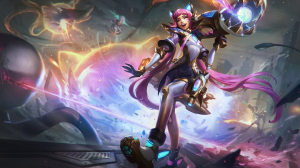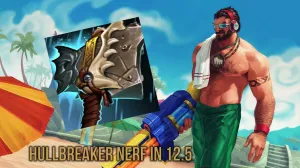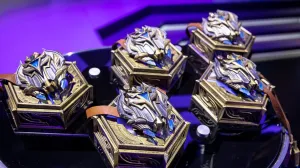Welcome back to the Owning the Arena series! Today, I’d like to address a pair of questions that a lot of newer Magic: The Gathering Arena players might have: What does metagame mean in MTG Arena? What is the MTG Arena meta?
Defining a metagame
If an MTG Arena deck is considered meta, that means that it is a part of what we call a metagame. A metagame is the ecosystem of decks and strategies in a given area or group of players.
For example, let’s say you play Magic: The Gathering at a game store with 10 players. Four of those players play Mono-U Tempo, three of them play Esper Control, two of them play Simic Nexus, and you play Mono-R Aggro. Based off of this information, or based off of this metagame, you can adjust your deck to be more successful against Mono-U Tempo since it represents 40 percent of the meta you play in.
The above example is very small, but it showcases my point well. In real life, however, metagames can encompass millions of players across the world. So how do we know what a metagame looks like across so many people?
Digital tools for analyzing the overall MTG Arena metagame
In order to understand the Magic: The Gathering meta as a whole, our feeble human minds need technology to help us. Below is a list of websites that can be used to look at the MTG Arena Standard metagame.
- MTG Goldfish: MTG Goldfish categorizes decks by what percent of the Traditional Standard best-of-3 meta they occupy in MTG Arena, paper play, and MTG Online combined. They also have the “Arena Standard” category where users submit decks that they use in best-of-1 on Arena.
- MTG Top 8: This site does a similar thing as MTG Goldfish, using data from MTG Online and paper tournaments to provide meta percentages for the decks seen frequently between them.
- Star City Games: Star City Games is a site that runs their own competitive events and posts the results. The information here can be seen via MTG Goldfish and MTG Top 8, but if you want to go straight to the source, this is it.
- MTG Arena Subreddit and official forums: While these resources aren’t specifically about the meta, they are full of thousands of people ready and willing to talk about all things MTG Arena. If you have any questions about the meta, what changes you should make to your deck to cope with a certain meta, or if you just wanna talk with others about MTG Arena, this subreddit and the official forums are great places to do those things.

How to utilize this information
Now you have those resources to really dig into so you can fully understand the overall meta. Now what? How can you use this?
- Tune your sideboard: Sideboards are there to help us adapt to different decks we may face in MTG Arena. Knowing the metagame can really help us shape our sideboards as optimally as possible. For example, If we look and see that Mono-U Tempo was the winner at Mythic Championship Cleveland and was three of the top 8 decks, we can assume that we’ll be seeing a lot more of it. With this information, we can recheck our sideboards to make sure they have good anti-Mono-U Tempo cards.
- Adjust your deck: If you find yourself constantly having to move a specific sideboard card into your deck after game 1 because it’s good against the meta, it may be worth it to go ahead and put that card in your main deck. This is called pre-boarding and is part of knowing how to utilize metagame information.
- Switch decks: Sometimes, on occasion, a meta becomes completely inhospitable to a certain deck. This doesn’t happen very often, but when it does it may be time to switch decks. For example, if you play Mono-R Aggro, you may find that a lot of people have gotten tired of being rushed down in four turns so they run a lot more early game removal, board wipes, and life gain. If they continued to do this, we would see Mono-R players switch to different decks because it’s hard for a deck like Mono-R to race against substantial amounts of early game interaction and life gain.
Conclusion
A big thank you to everyone who read this far! Check out other entries in this series if you missed them. I hope I was able to shed some light on the topic of the MTG Arena meta for some of the newer players out there. I’ll see you all in the arena!






